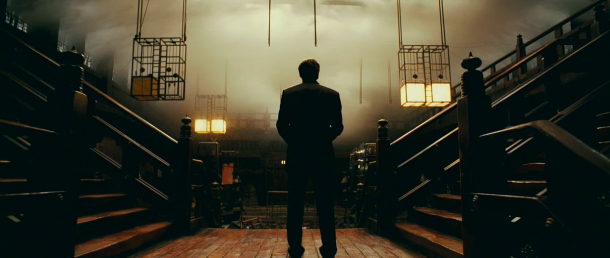
There is a lot to admire about Inception, and the movie is an unquestionable must-see. Christopher Nolan's epic has a massive conceptual scope, a varied and talented cast, startling visuals, and it exhibits the mastery of filmmaking craft that Nolan has become known for. The movie moves along at a fast pace - perhaps a little too fast, which is the same criticism I had of Nolan's otherwise outstanding The Dark Knight - and delivers a thrilling narrative that is tightly constructed and carefully delivered. But plot is heavily favored here, to the point that the opening hour amounts to an assault of information, an extraordinarily detailed setup that is unquestionably ambitious, but borders on the numbing. The exclusive focus on exposition in the first half is detrimental to this otherwise absorbing picture in two ways: it prevents substantial character development, and is too transparently a justification of the film's second half.
I'll keep the plot summary brief in order to avoid spoilers, and because everyone and their grandmother is going to go see this movie anyway. Leonardo DiCaprio and Joseph Gordon-Levitt play Dom and Arthur, respectively, a pair of professionals who specialize in securing - and/or stealing - the thoughts of their clients. They access intellectual capital by entering their subjects' dreams, where they can manipulate or extract information, depending upon the nature of the job. On the run from their corporate employer, the two are hired by their one-time subject, Saito (Ken Watanabe), to perform an "inception" - planting a thought or idea in the mind of another. They accept, and go about assembling a team to design and execute the dream, a multi-layered affair containing dreams-within-dreams. However, Dom's personal demons - guilt over his relationship with his wife Mal (Marion Cotillard) and her unwelcome intrusions into his own dream-world - put the entire mission, and the lives of his team, at risk.
A thrilling opening sequence grabs us by the short and curlies, and tosses us headfirst into the film's roiling, sensory-intensive universe. But shortly thereafter things quickly devolve into a long and long-winded tour of The Rules of Dreamland - how dreams are accessed, how they can be manipulated, how the members of the team should and should not behave while inside a subject's dream, and so on. Of course, no film that operates in a realm of fantasy can or should try to avoid setting up its own rules - they fundamentally establish narrative credibility and help the film engage with the audience in an honest way. But Inception largely sets aside the ambitions of its own story while taking a full hour to explain its concept in plain terms, and mostly through expository dialogue, which is one of filmdom's easiest storytelling cheats - and one that is always in danger of losing an audience. Film is a visual medium, and Nolan's over-dependence on bald-faced exposition flattens his otherwise ingenious concept.
Once DiCaprio's "dream team" (himself, Gordon-Levitt, and four others) enters the dreams of their subject (a business executive played by Cillian Murphy), the film takes off just as we know it should. The different layers of the dream take place, respectively, in a version of New York City, inside an opulent hotel, and at a snow-bound mountain fortress worthy of SPECTRE. (Kudos to Nolan for gun battle on skis, especially now that the Bond franchise is in limbo.) The dream's nested narratives in themselves represent a filmmaking challenge like nothing else in big-budget Hollywood cinema. Which brings me to what will potentially - and hopefully - be the most salient and lasting thing about Inception: if the film succeeds, it may awaken Hollywood's awareness of the market for intelligent blockbusters. Although it's not perfect, this film proves the potential of significant cinematic resources in the hands of an auteur with a vision, as opposed to being entrusted to a bunch of suits topped by fat-filled skulls.
Despite a plot-packed script that scrimps a bit on character development, the uniformly excellent cast makes the most of their varied roles. DiCaprio is given little to do with the exception of a handful of scenes - especially toward the climax - that, despite their emotional appeal, are rushed by the demands of the detail-driven plot. Tiny Ellen Page is strong as the dream "architect," a university student who also uncovers the extent to which DiCaprio has unwittingly endangered the entire crew. Cotillard is commanding as Mal; it's a John Locke-type role in that it calls for difficult shadings to suggest a potentially sinister other-ness. And Tom Berenger (!) shows up - his presence somehow cheered me, even though he seems to have taken the Mickey Rourke route and donned a mask of his own face.
Christopher Nolan continues to grow and excel as a filmmaker with a consummate sense of craft, a bold vision, and the balls to execute it with great skill. From a technical perspective, Inception is flawless. The writer-director is aided here by many members of his Batman team: photographer Wally Pfister, editor Lee Smith, and composer Hans Zimmer - all of whom deliver stellar work. They are joined by production designer Guy Dyas, who is charged with the task of designing a broad variety of fictional locations, and succeeds wonderfully. Although Nolan unwisely front-loads Inception with an inordinate quantity of detail, the film is recommended.

No comments:
Post a Comment